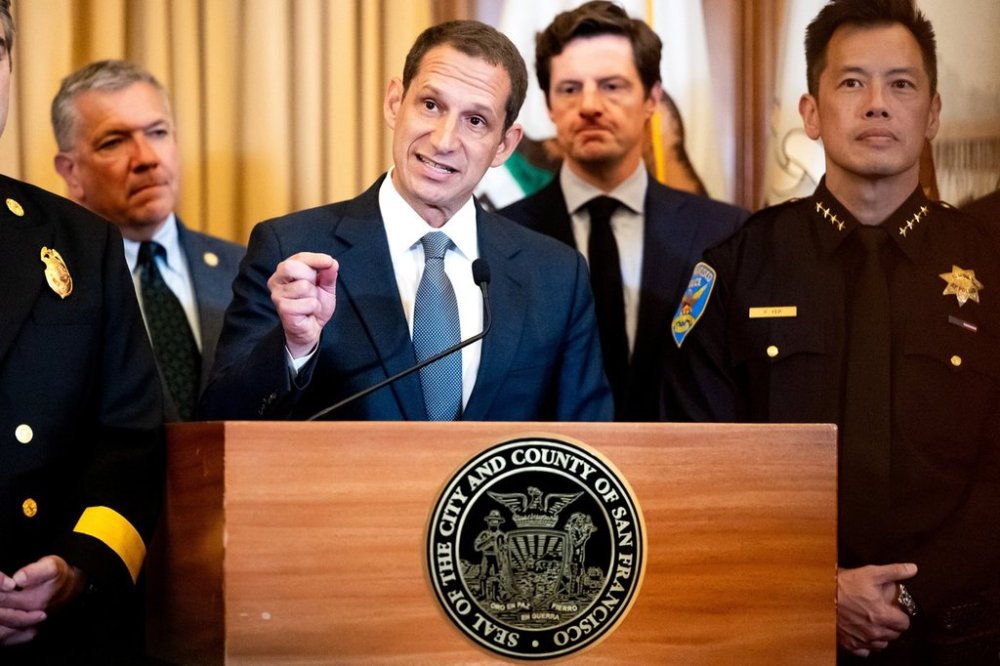World
Trump Backs Off Federal Force in San Francisco After Key Calls

President Donald Trump announced he would not deploy federal force in San Francisco, a city he has often criticized for its liberal governance. This decision followed discussions with influential tech leaders and the city’s mayor, who urged him to reconsider.
During a press briefing at the White House, Trump revealed that conversations with Jensen Huang, CEO of Nvidia, and Marc Benioff, CEO of Salesforce, played a pivotal role in his decision. Both leaders emphasized the city’s ongoing efforts to combat crime. “They told me San Francisco was working hard to reduce crime,” Trump stated. “So we are holding off that surge, everybody. And we’re going to let them see if they can do it.”
Trump had initially planned to increase federal presence in San Francisco on March 9, 2024, but did not clarify whether this involved the National Guard or immigration enforcement. His comments came as U.S. Customs and Border Protection agents arrived at a nearby Coast Guard base, prompting protests from local residents.
The outreach from tech executives significantly influenced Trump’s rare decision to provide a reprieve to a Democrat-led city. Mayor Daniel Lurie, who has maintained a cooperative stance toward Trump, also contributed to the president’s change of heart. Since his election in November, Lurie has focused on local issues rather than engaging in national political disputes.
“We are seeing a decline in overall crime by 26% compared to last year, with car break-ins at a 22-year low,” Lurie pointed out during a news conference. He expressed gratitude for the president’s acknowledgment of the city’s progress, stating, “I told the mayor, I love what you’re doing, I respect it, and I respect the people that are doing it.”
Lurie, who inherited a significant fortune from the Levi Strauss company, has positioned himself as a centrist Democrat dedicated to improving San Francisco’s conditions. He has actively sought to collaborate with federal authorities on public safety issues, particularly concerning the city’s ongoing struggles with fentanyl-related crime.
While Lurie welcomed continued partnership with federal agencies, he cautioned that the presence of militarized forces could hinder the city’s recovery efforts. “Having the military and militarized immigration enforcement in our city will hinder our recovery,” he asserted.
Former Speaker of the House Nancy Pelosi commended Lurie’s leadership on social media, while Steve Kerr, head coach of the Golden State Warriors, praised him as an “absolute superstar.” California Governor Gavin Newsom, a frequent critic of Trump, remarked that the president had “finally, for once, listened to reason.”
Despite the positive response from some city leaders, skepticism remains regarding Trump’s commitment to his decision. San Francisco Supervisor Connie Chan expressed concerns about trusting the president, while Supervisor Jackie Fielder criticized Lurie’s inclination to coordinate with federal law enforcement, labeling it a dangerous move.
During his press briefing, Trump revealed he had received “four or five calls” from business leaders urging him to allow local officials to manage the situation independently. “They’re the biggest people in the world, a lot of the high tech,” he said. “If it doesn’t work out, we’ll do it for you very quickly.”
Benioff had previously suggested that the National Guard could assist in reducing crime before retracting his statement amid backlash. He confirmed to the Associated Press that he communicated with Trump but did not elaborate on the conversation.
While Trump’s decision primarily concerns San Francisco, other cities in the Bay Area, including Oakland, remain under scrutiny as the president has previously threatened to send federal forces there as well. The contrasting approaches of various Democrats toward Trump’s policies highlight the complexities of local governance amid national political tensions.
As the situation unfolds, San Francisco leaders remain focused on local recovery efforts, emphasizing collaboration and community engagement as key components of their strategy for improvement.
-

 Science3 months ago
Science3 months agoToyoake City Proposes Daily Two-Hour Smartphone Use Limit
-

 Top Stories3 months ago
Top Stories3 months agoPedestrian Fatally Injured in Esquimalt Collision on August 14
-

 Health3 months ago
Health3 months agoB.C. Review Reveals Urgent Need for Rare-Disease Drug Reforms
-

 Technology3 months ago
Technology3 months agoDark Adventure Game “Bye Sweet Carole” Set for October Release
-

 World3 months ago
World3 months agoJimmy Lai’s Defense Challenges Charges Under National Security Law
-

 Lifestyle3 months ago
Lifestyle3 months agoVictoria’s Pop-Up Shop Shines Light on B.C.’s Wolf Cull
-

 Technology3 months ago
Technology3 months agoKonami Revives Iconic Metal Gear Solid Delta Ahead of Release
-

 Technology3 months ago
Technology3 months agoApple Expands Self-Service Repair Program to Canada
-

 Technology3 months ago
Technology3 months agoSnapmaker U1 Color 3D Printer Redefines Speed and Sustainability
-

 Technology3 months ago
Technology3 months agoAION Folding Knife: Redefining EDC Design with Premium Materials
-

 Business3 months ago
Business3 months agoGordon Murray Automotive Unveils S1 LM and Le Mans GTR at Monterey
-

 Technology3 months ago
Technology3 months agoSolve Today’s Wordle Challenge: Hints and Answer for August 19









